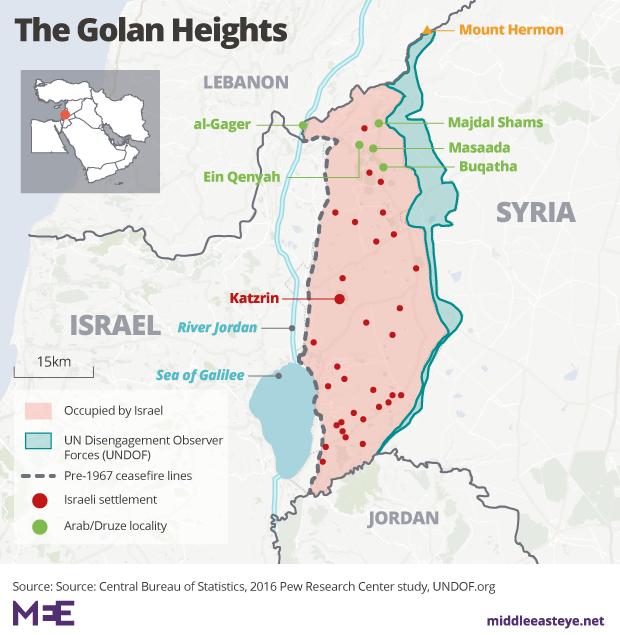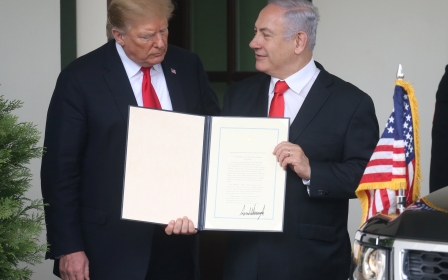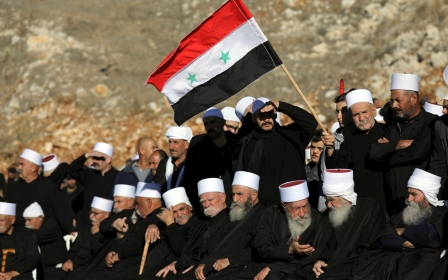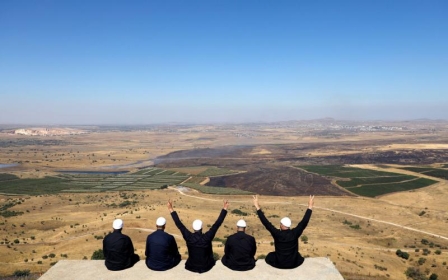US under fire from major powers at UN over Golan decision
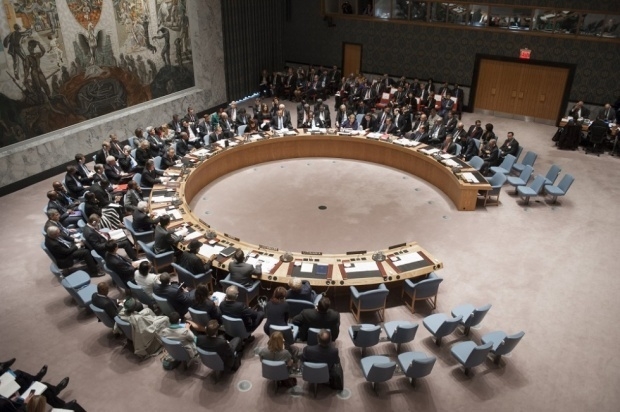
The United States faced sharp criticism on Wednesday at the UN Security Council over its decision to recognise the occupied Golan Heights as Israeli territory, which major powers denounced as a violation of UN resolutions.
US President Donald Trump signed a proclamation alongside Israeli Prime Minister Benjamin Netanyahu on Monday in which the US recognized Israel's annexation of the strategic plateau that it seized in 1967 and annexed in 1981.
Britain, Washington's closest ally, said the decision was in violation of Resolution 497 that declared Israel's annexation of the Golan as "null and void".
France warned that any attempt to turn away from international law was "doomed to fail" as Washington prepares to unveil its Middle East peace proposals.
Russia appealed to governments to reject the US decision and to continue to view the Golan as Israeli-occupied territory, the AFP news agency reported.
"If anybody feels any temptation to follow this poor example, we would urge them to refrain from this aggressive revision of international law," said Russian Deputy Ambassador Vladimir Safronkov.
On Saturday, ahead of the signing, local residents of the Golan Heights told Middle East Eye they generally remained unphased and ultimately unsurprised by Trump's move, which they saw as a blatant ploy by the president to help Netanyahu ahead of Israeli elections in less than two weeks' time.
'Give Israel North Carolina'
The council was meeting at the request of Syria, which in a letter to the council called the US decision a "flagrant violation" of three UN Security Council resolutions which call on Israel to withdraw from the Golan Heights.
The Syrian representative condemned Trump's declaration, calling it a "slap in the face to the entire world," and "unilateral behaviour, which has no legal or political value".
"Give Israel North Carolina, why not. It's wonderful land. Give them some land from your states if you really want to support Israel," he said.
The US defended its decision, arguing it bolstered Israel's security and could contribute to the stability of the entire Middle East by keeping Syria and its Iranian ally in check.
To allow the Golan to be controlled by Syria "would turn a blind eye to the threats emanating" from Damascus and from Iran and its Hezbollah allies that want to use the Golan to attack Israel, said US diplomat Rodney Hunter.
The Golan Heights: Why it matters
+ Show - HideOfficially part of Syria since the country’s independence in 1944, the Golan Heights is a strategic plateau straddling Israel and Syria and overlooking southern Lebanon.
It was captured by Israel during the Middle East war of 1967 and subsequently annexed in a move never recognised by the international community.
The Golan is recognised as part of Syria by the United Nations. UN Resolution 242 calls for Israel to withdraw from the Golan and other occupied territories including the Gaza Strip and the West Bank.
However, Israel has repeatedly refused to do so and in 1981, it formally annexed the Syrian territory.
A UN peacekeeping force has patrolled the demarcation line between Syrian and Israeli-controlled areas of the Golan since 1974.
Israel has constructed settlements that are illegal under international law in the occupied territory and settled its citizens there.
Some 20,000 Israeli settlers currently live in the Golan, alongside around 26,000 of the territory’s native inhabitants, who are predominantly Druze and identify as Syrian.
Since the Syrian war erupted in 2011, Syrians in the Golan taking Israeli citizenship has become more common, though the vast majority reject it.
The Golan is thought to provide around one-third of Israel's fresh water supply. Water from the territory flows into the Sea of Galilee and Jordan River.
Other than its strategic significance - the Golan is the only land border between Israel and Syria - the territory is also used by Israelis for leisure purposes. The area counts an Israeli ski resort and several vineyards.
Despite its decision to recognise Israeli sovereignty over the Golan, the US called for a UN peacekeeping mission deployed in a buffer zone there to remain in place.
The 1,000-strong UN Disengagement Observer Force (UNDOF) was dispatched to a buffer zone between Israel and Syria in the Golan in 1974, tasked with monitoring a ceasefire.
Trump's decision prompted speculation that Washington would seek to end the UNDOF mission when its mandate comes up for renewal in June.
"This announcement does not affect the 1974 Disengagement Agreement, nor do we believe it undermines UNDOF's mandate in any way," said Hunter, adding that UNDOF "continues to have a vital role to play in preserving stability between Israel and Syria".
China recalled that UN resolutions declare the Golan as a territory occupied by Israel, with Deputy Ambassador Wu Haitao adding that "China is opposed to any unilateral action that attempts to alter that fact".
Germany took a swipe at Syria for invoking international law, accusing it of blatantly disregarding UN resolutions by attacking schools and hospitals during eight years of war.
UN diplomats were awaiting the outcome of an Arab League summit in Tunis on Sunday that could lead to action at the UN to counter the US decision on the Golan.
Middle East Eye delivers independent and unrivalled coverage and analysis of the Middle East, North Africa and beyond. To learn more about republishing this content and the associated fees, please fill out this form. More about MEE can be found here.



